- Stat Significant
- Posts
- The Fall and Rise of Nicolas Cage: A Statistical Analysis
The Fall and Rise of Nicolas Cage: A Statistical Analysis
Nicolas Cage: A Data Story
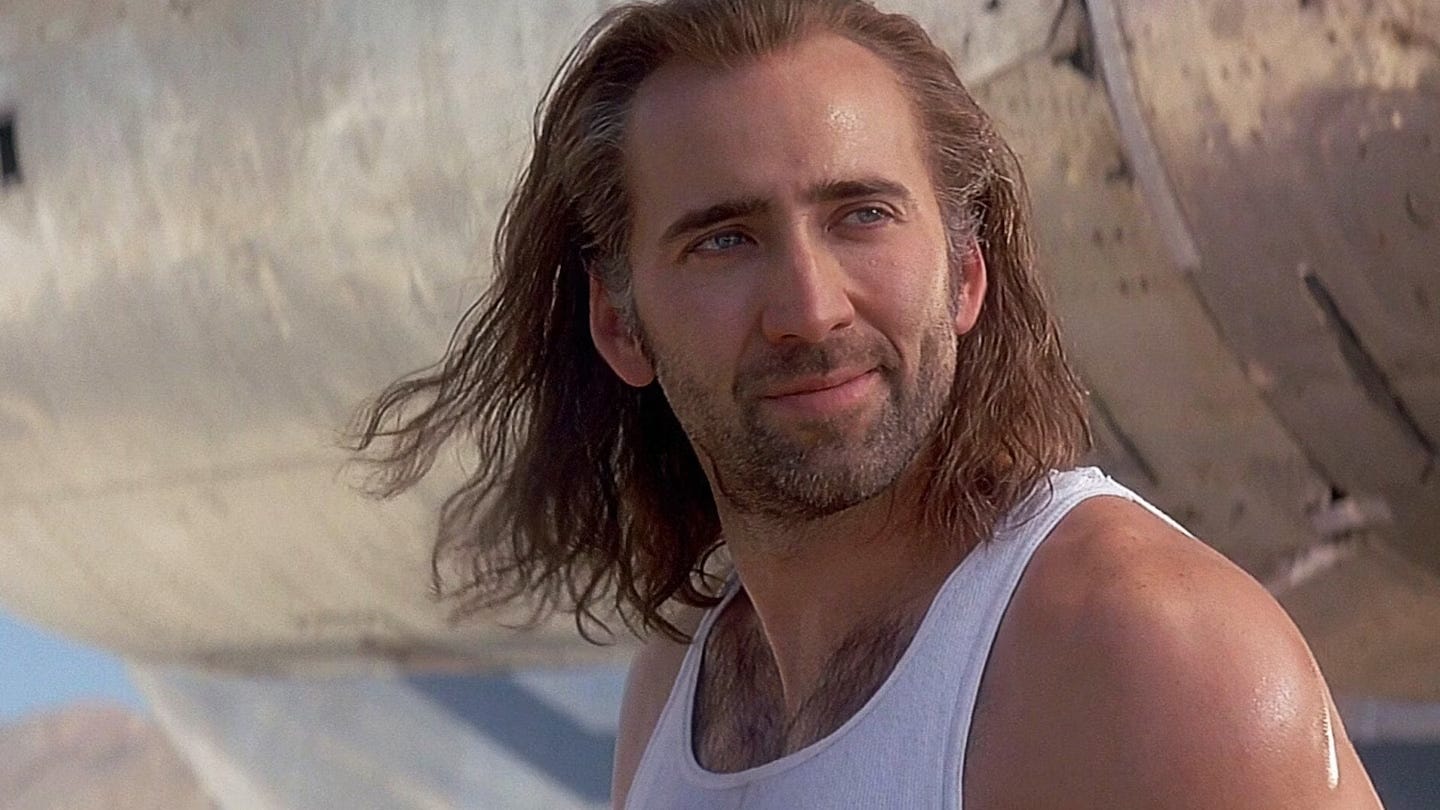
Con Air (1997). Credit: Walt Disney Motion Pictures.
Intro: Nicolas Cage Is Back (For Now)!
Has anyone in Hollywood had a more chaotic career than Nicolas Cage? Every few years or so, the internet deems Cage to "be back"—having recovered from a series of significant career missteps—on the up-and-up amid another "Cage-aissance." This past year, Cage earned a Golden Globe nomination for his work in A24's Dream Scenario and played the titular serial killer in Neon's surprise indie hit Longlegs, signifying (yet another) triumphant resurgence for Cage.
In the 1990s and early 2000s, Nicolas Cage was a premier action star and art house darling, headlining some of the most beloved films of the era (National Treasure is a classic; I don't care what you say) and earning an Oscar for his work in Leaving Las Vegas. But in the mid-2000s, Cage's fortunes began to decline (in spectacular fashion), with the actor losing his elite pedigree and falling into a series of low-budget B-movies.
And yet, through sheer perseverance and quirky personality, the idiosyncratic actor has found his way back to cultural relevancy. The man is an entertainment success story, failure story, and comeback story all bundled into one.
So today, we'll explore the rise, fall, and rise of Nicolas Cage. We'll deconstruct the actor's unconventional style (and choices), the meme-ification of Cage, and how his authenticity and internet fame resurrected his career.
Nicolas Cage, The Prolific Actor and Big Spender
Nicolas Cage is a movie-making machine. In fact, Cage boasts the most starring roles amongst performers with +$1B in lifetime box office, with more than 85 lead roles on his resume.

These stats are even more astounding when you consider that Cage's career is far from over. But what led this absurdly distinctive individual to such unprecedented acting output? Was it a love of movie-making or something more? The answer is both—though money may be the driving factor.
Nicolas Cage's financial troubles began in the late 2000s, brought on by extravagant purchases and substantial tax debts. Cage's lavish spending on impractical luxury items is the stuff of legend and could easily warrant its own dedicated analysis.
Here are some highlights from Cage's long list of questionable purchases:
A Haunted House: In 2007, Cage purchased the LaLaurie Mansion in New Orleans, a property notorious for its dark history and rumored to be haunted.
A Dinosaur Skull: In 2007, Cage outbid fellow actor Leonardo DiCaprio for a rare dinosaur skull at an auction. The skull, which cost $276,000, turned out to be stolen, and Cage eventually had to return the artifact to the Mongolian government.
Two Cobras: Cage once owned two king cobras but had to have the reptiles re-homed in a zoo after his neighbors complained.
Multiple Castles: Cage once owned two ancient European castles. The actor referred to his real estate purchases as his "holy grail quest."
Cage's financial woes were further exacerbated by a $6.2 million tax penalty and a legal dispute with his former business manager over reckless spending.
To make matters worse, Cage's financial struggles came after a string of box-office disappointments that significantly damaged his status as a top-tier actor. Lacking offers from Hollywood studios, Cage was forced to star in over twenty-five direct-to-video movies to repay his debts.
Direct-to-video movies (D2V) represent a low-cost, low-demand, and low-quality segment of the movie market (though, funny enough, these movies have now found a home on streaming services like Netflix, which favors low-cost film projects). I would list some of Cage's notable D2V credits, but you would never know them and should never see them.
Examining the actor's project output over time, we see a sizable spike in film releases in the 2010s and early 2020s, driven by Cage's turn to rapid-fire D2V work following his near-bankruptcy.
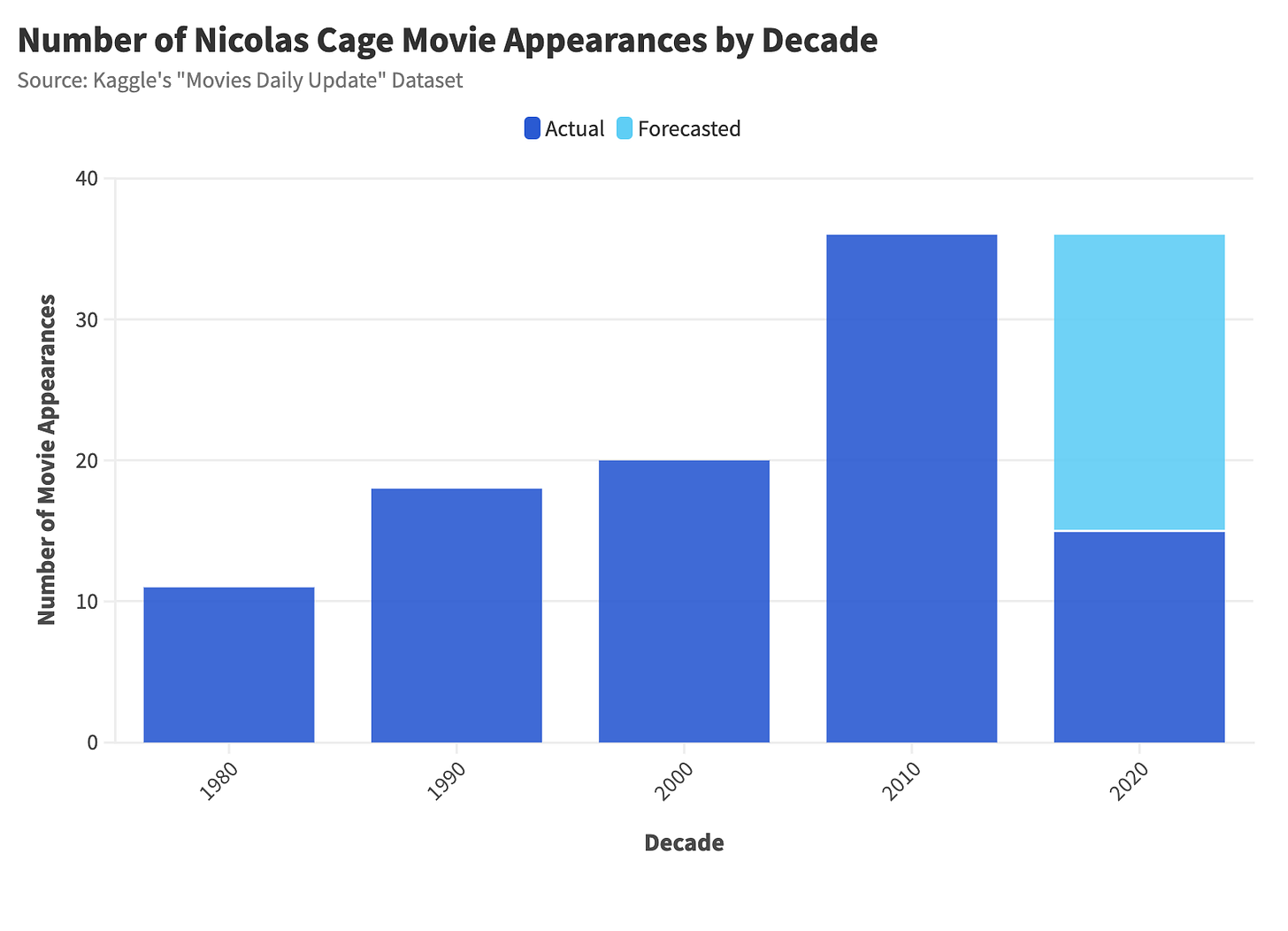
That said, Nicolas Cage's movie output may slow in the coming years as the embattled star allegedly finished paying off his debts sometime in late 2020. Or, maybe Cage will keep pumping out content because that's just what the man does.
Nicolas Cage, The Rise and The Fall
Cage's career is a roller coaster ride of audacious success and painful failure. Examining the box office and budgeting for his movies over time, we see Cage explode into Hollywood's big-budget mainstream in the mid-90s.
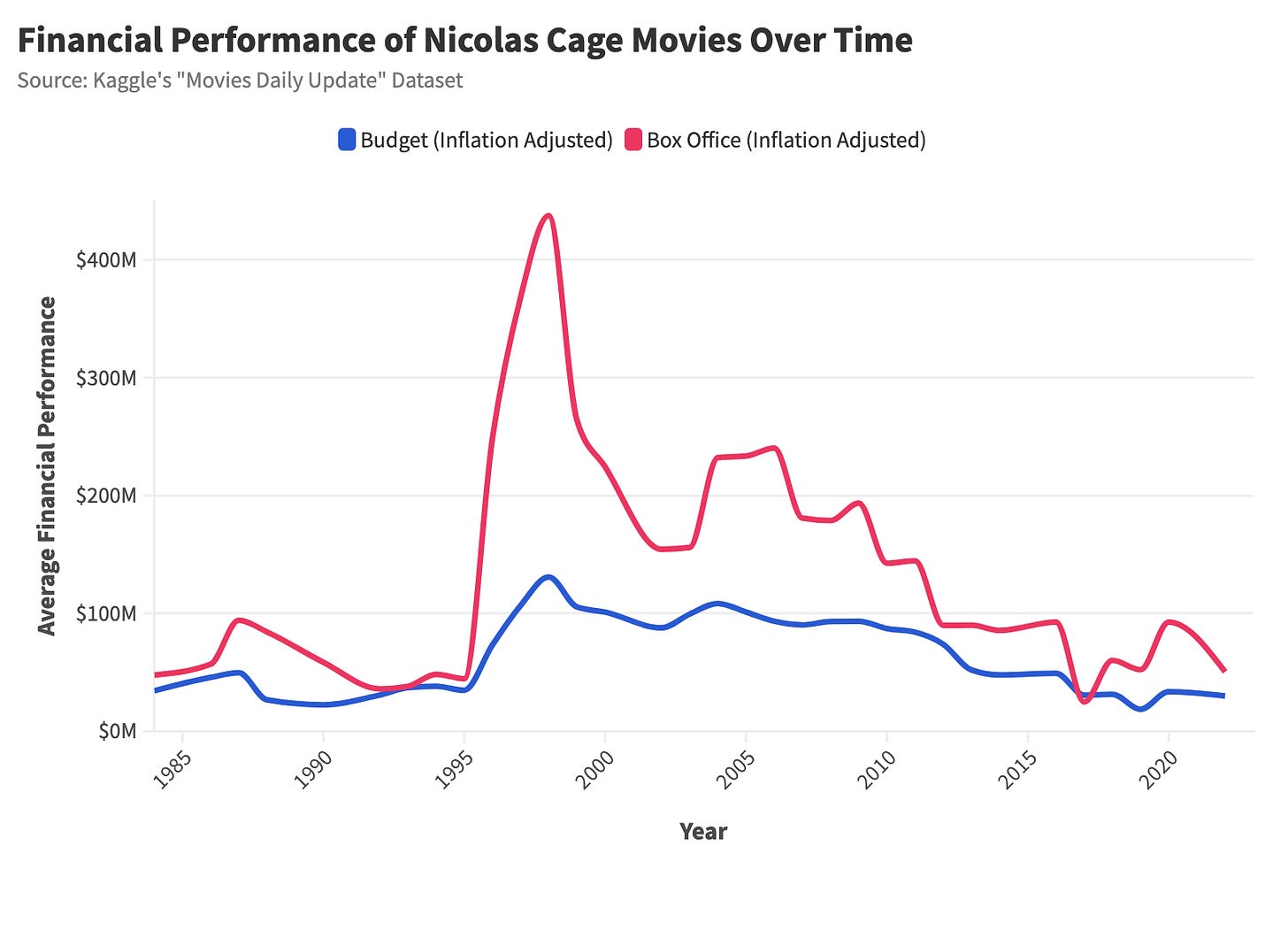
Cage cemented his status as an action hero with a string of memorable performances in giant blockbusters such as The Rock (1996), Con Air (1997), and Face/Off (1997). These films demonstrated the actor's uncanny ability to balance intensity, bizarro theatrics, and vulnerability.
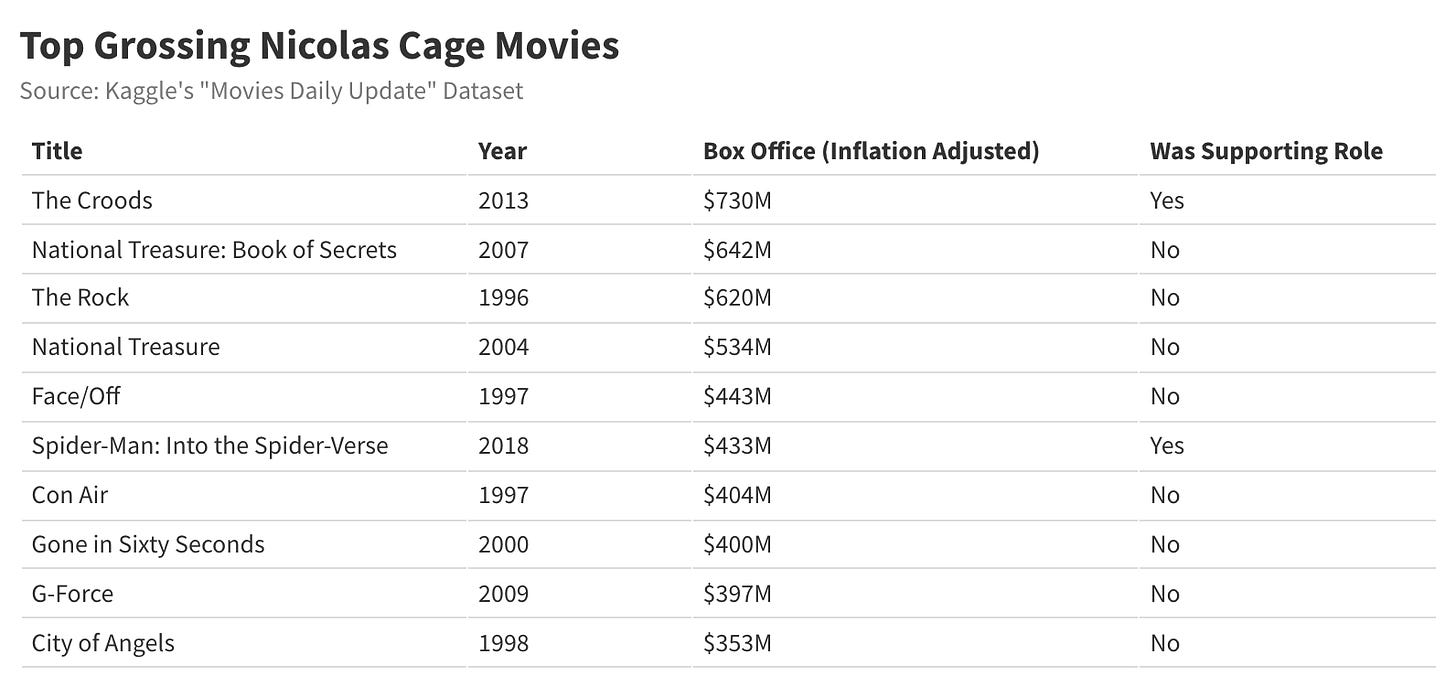
Throughout the early 2000s, Cage saw continued success in big-budget action films, including Gone in 60 Seconds (2000), National Treasure (2004), and National Treasure: Book of Secrets (2007). He stole the Declaration of Independence, and it was awesome.
But then things took a turn. Beginning in the mid-2000s, Cage's project quality began to decline. These misfires were punctuated by the now-infamous The Wicker Man (2006), a remake that garnered ridicule for its outlandish plot and Cage's otherworldly performance, including the notorious "Not the bees!" scene. If you have yet to see the Wicker Man bees scene, do yourself a favor and give it a watch (after you finish this article). It's perhaps the greatest-worst-greatest-weirdest acting performance of all time.

The Wicker Man (2006). Credit: Warner Brothers Pictures.
Cage's fortunes continued to decline after a series of major flops, including Ghost Rider: Spirit of Vengeance (2011), Season of the Witch (2011), and Drive Angry (2011), with each failure further dampening the actor's commercial appeal and negatively impacting the budget and box office of future projects. However, financial performance is only one side of the story.
In recent years, Cage has slowly clawed his way out of movie jail, taking supporting roles in higher-budget studio projects, such as Into the Spiderverse (2018) and The Croods (2013), and providing strong starring performances in critically acclaimed low-budget indies, like Pig (2021), Mandy (2018), and Dream Scenario (2023).
As a result, the average critical acclaim of his projects (as measured by Metacritic) has slowly trended upward.
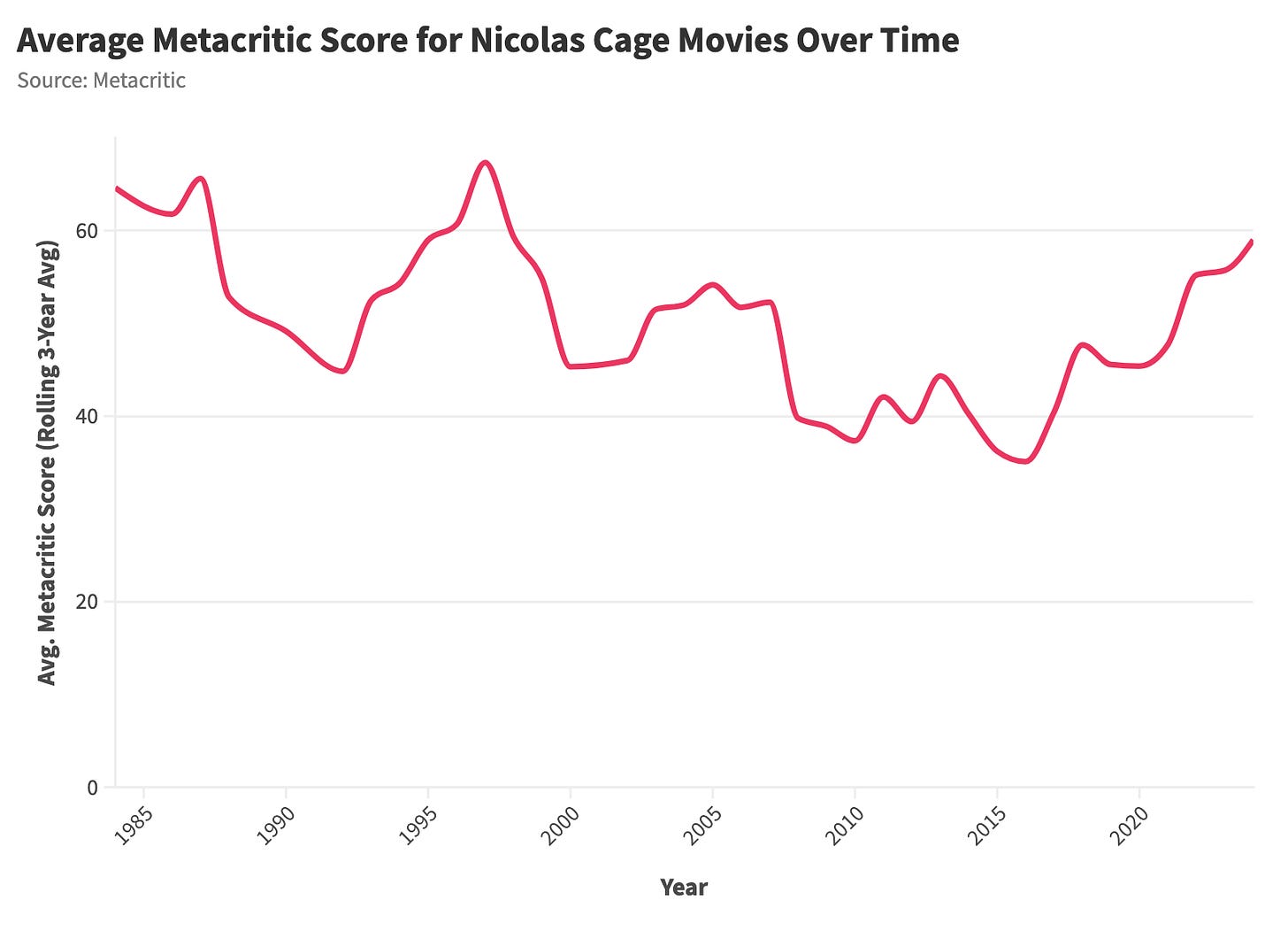
This upswing in critical acclaim and the repayment of his debts pose a brighter future for Cage (or so I hope).
Nicolas Cage, The Unpredictable Hollywood Legend
Sometimes, Nicolas Cage's filmography reads as if produced by a random number generator, even before the actor began experiencing money troubles. The variability of Cage's work is a testament to his intrepid acting approach (for better or worse) and his eagerness to explore various roles and genres (also for better or worse).
Cage's erratic project selection has become central to his public persona—he can deliver inglorious flops (re: the bees!) and academy-award-winning performances (re: Leaving Las Vegas and Adaptation).
We can illustrate this phenomenon by charting the lifetime box office earnings and variability of movie ratings for top-earning Hollywood actors. Our resulting output should roughly provide us with the following two-by-two (and some colorful quadrant names).
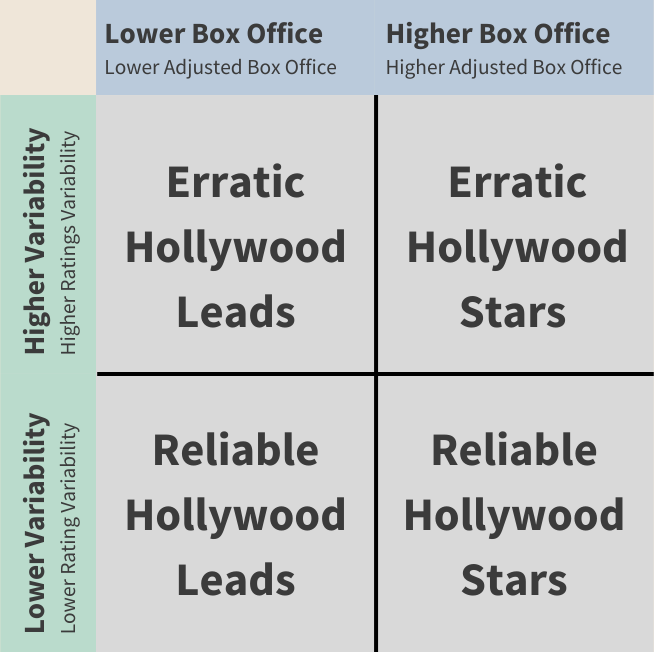
We'll define "top-earning" performers as those who have grossed over $1B in lifetime inflation-adjusted box office. Suppose Cage meets our definition of a highly successful Hollywood star (above-average box office) with inconsistent project quality (above-average ratings variability); in that case, we should find him in the "Erratic Hollywood Stars" quadrant beside other polarizing-yet-memorable figures.
Indeed, Cage firmly occupies the top right quadrant of this chart, alongside cult heroes like Adam Sandler, Arnold Schwarzenegger, and John Travolta.

Similar to Cage, stars like Sandler, Schwarzenegger, and Travolta have experienced massive critical and commercial success—Uncut Gems, Terminator 2, and Pulp Fiction, respectively—and seismic failures—Jack and Jill, Batman & Robin, and Battlefield Earth, respectively.
These actors can survive major flops due to their distinctive personalities, previously accumulated career capital, and loyal fanbases. Like Cage, enigmatic figures such as Travolta and Schwarzenegger possess larger-than-life personalities that captivate fans and critics alike, allowing them the freedom to experiment across genres, roles, and acting styles.
Need Data Help? Stat Significant Has You Covered!

Enjoying the article thus far and want to chat about data and statistics? Need help with a data or research project? Well, you’re in luck because Stat Significant offers data science consulting services!
If you're looking to turn your data into strategic growth, drop me an email at [email protected], connect with me on LinkedIn, or book a free data consultation at the link below.
Nicolas Cage, The Meme
Is it surprising that an eccentric actor known for over-the-top performances, absurd personal foibles, and a handful of cringe-inducing performances has been embraced by meme culture? In many ways, Nicolas Cage (and his on-screen persona) were perfectly crafted to resonate with absurdist digital humor.
In 2011, a meme featuring Nicolas Cage's performance in the 1988 film Vampire's Kiss began circulating on various social media sites. Cage's character displays an exaggerated facial expression, to which meme artists added the caption "You Don't Say?" Soon, the meme became internet shorthand for expressing disbelief or responding sarcastically to an obvious statement.
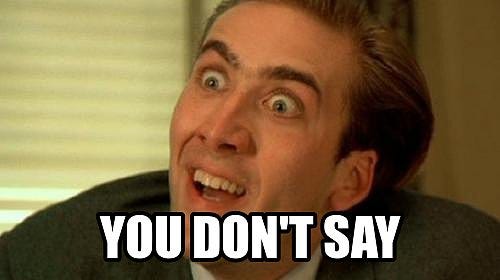
The meme exploded across the internet, becoming a staple of digital culture and securing Cage's unique legacy as an ironic online figure. Cage has continued to be meme-d across the internet for various over-the-top performances and his eccentric cult hero status.
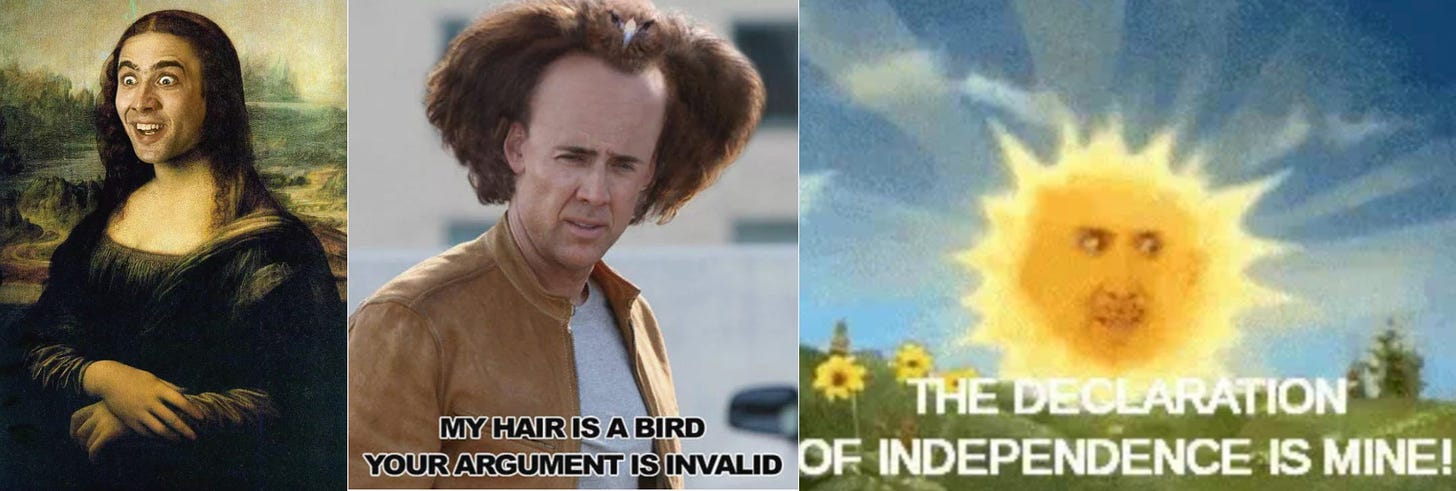
Examining Google Trends data, we see Nicolas Cage (and his meme-ification) rise to prominence in 2012 following the popularization of the "you don't say" meme. Following this initial surge, Cage-related meme content sustains a consistently high level of search interest.
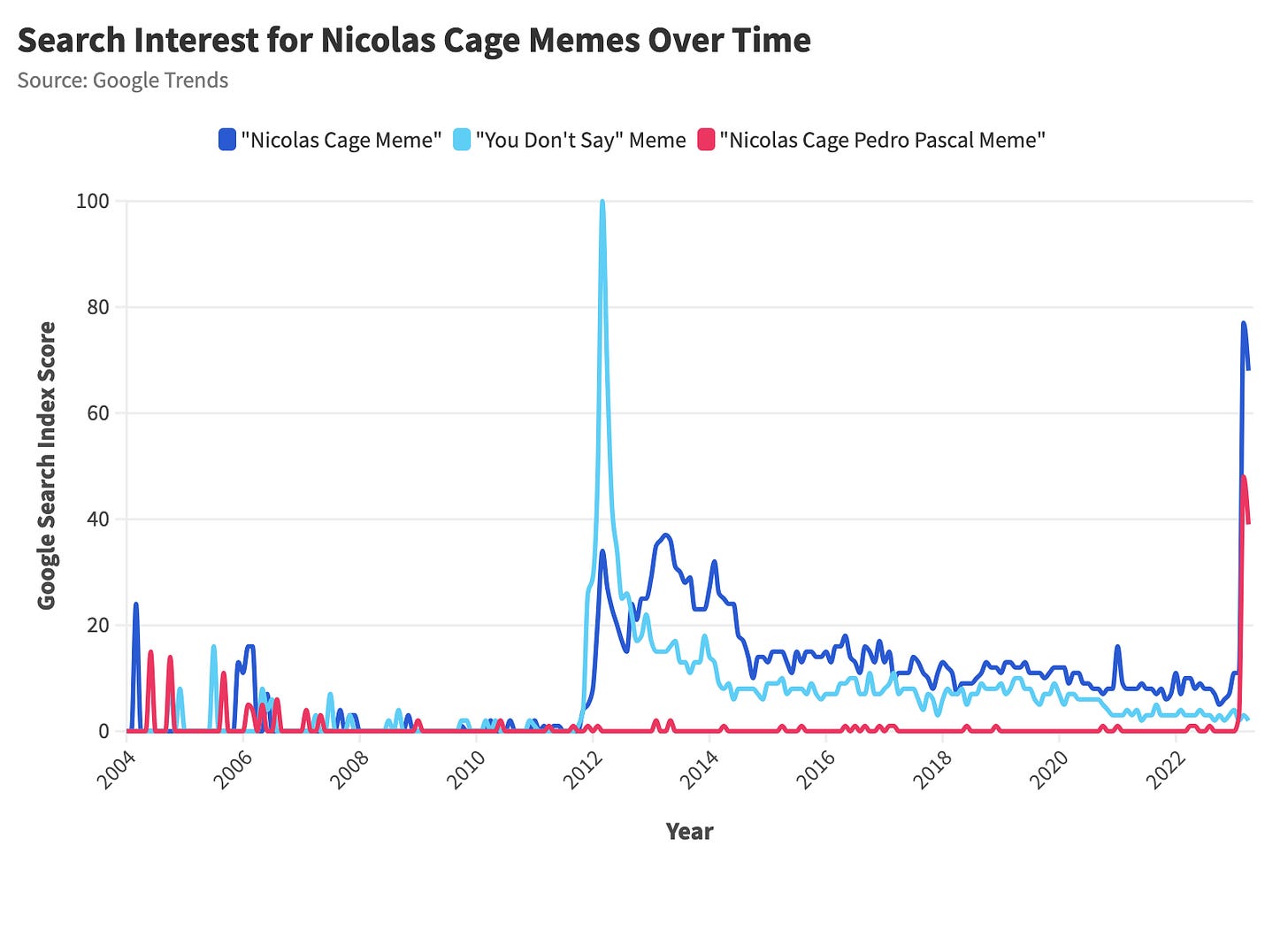
And then, in 2022, Cage's meme-ification reached its peak in a film starring Nicolas Cage as a meme of Nicolas Cage (pretty meta). In The Unbearable Weight of Massive Talent (2022), Cage plays a fictionalized version of himself roped into a high-profile spy operation. Cage claims that this portrayal bears little resemblance to his real-life personality, yet it's near-impossible to distinguish what's fact or fiction when it comes to Nick Cage.
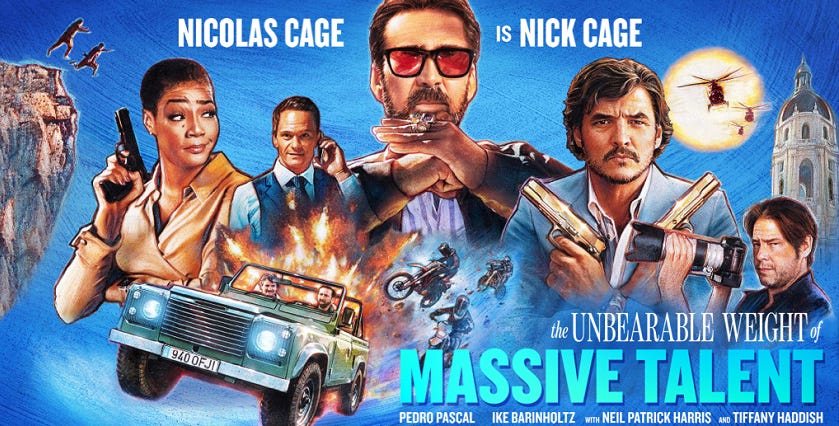
The Unbearable Weight of Massive Talent (2022). Credit: Lionsgate Films.
Although The Unbearable Weight of Massive Talent disappointed commercially, the film propelled Cage back into the mainstream, capitalizing on his digital celebrity, forever loyal fanbase, and Hollywood's love of nostalgia. Leading up to the film’s release, a Reddit AMA (ask me anything) with Cage became the most upvoted post on r/AMA that year, easily surpassing high-profile figures like Bill Gates, Jon Stewart, and LeVar Burton.
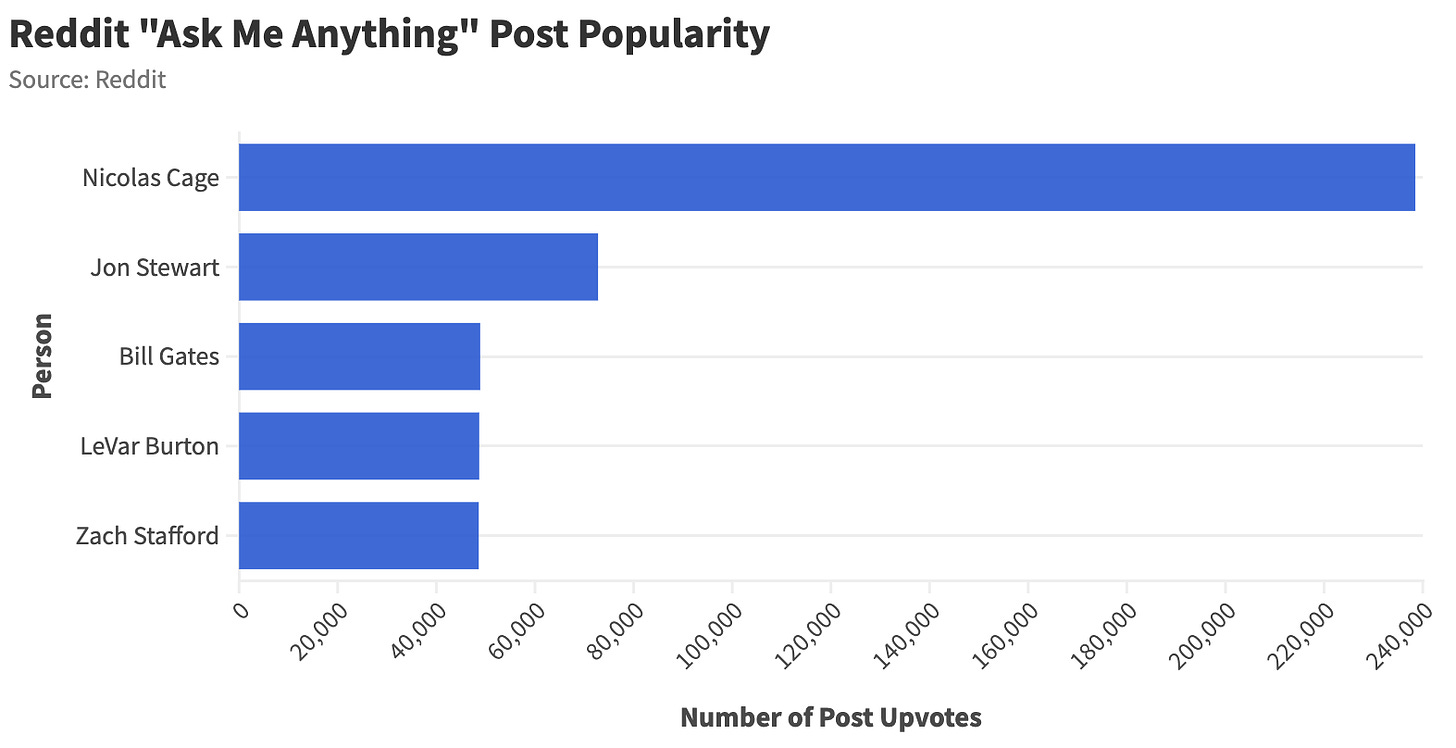
The film itself produced another spike in Cage meme-ification due to an over-the-top scene between Cage and Pedro Pascal, where Pascal appears to be channeling his inner Nicolas Cage.

Furthermore, The Unbearable Weight of Massive Talent has provided Cage with enduring career capital, as search interest for his movies has remained elevated following the film's release.
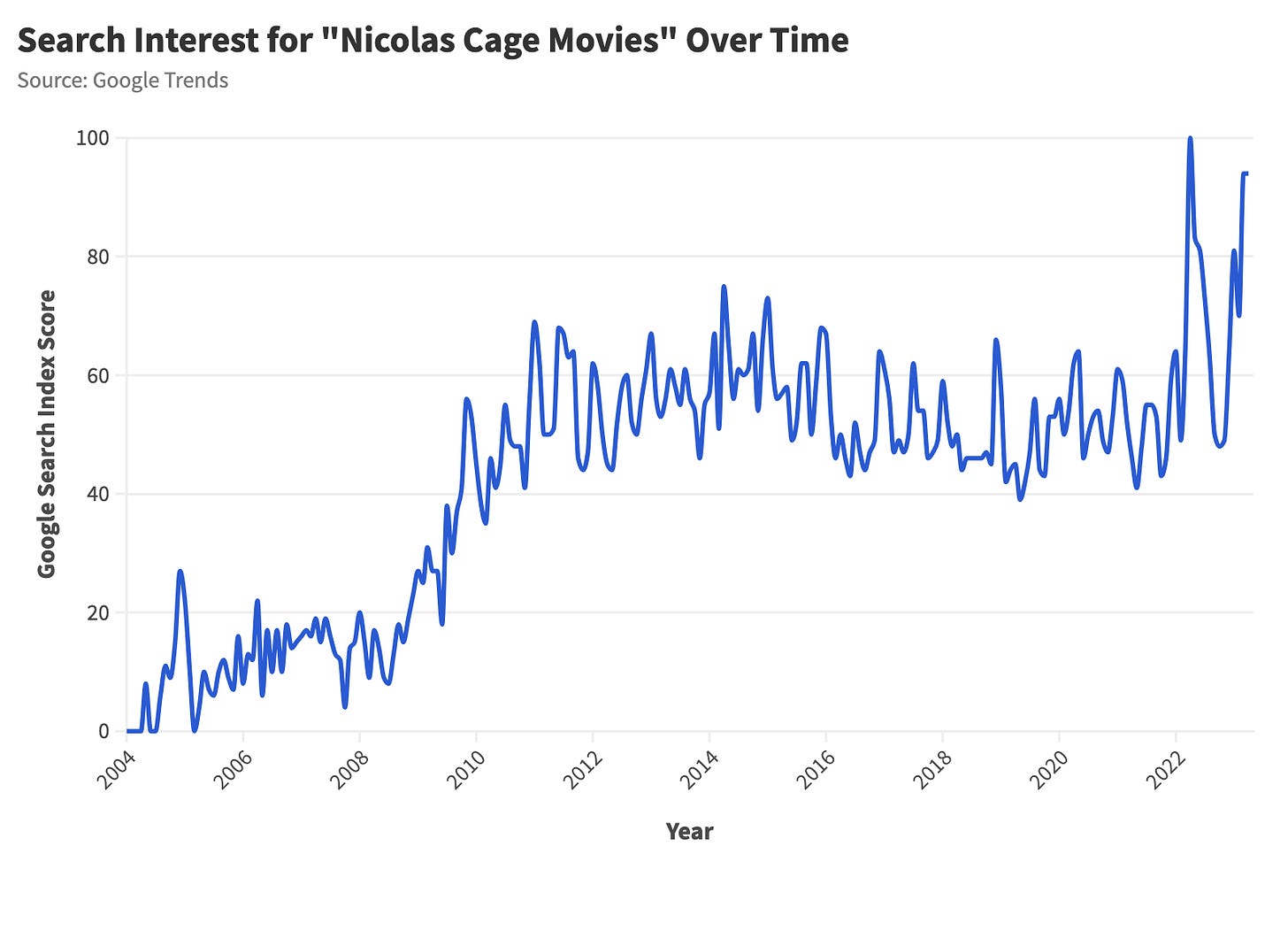
Perhaps these searches are just the product of meme activity, but in an entertainment industry desperate to capture milliseconds of consumer attention, there's no such thing as bad press. Hollywood may perceive renewed commercial value in Nicolas Cage, the meme mascot.
So, did memes and internet culture somehow salvage Cage's career? Quite possibly. On the one hand, the eccentric actor's memorable performances and quirky personality have always made him worthy of attention, digital or otherwise. At the same time, Cage's second life as internet iconography has undoubtedly fueled his continued cultural relevance, especially with younger generations (who don't care about Con Air or Face/Off). He might be one of the rare individuals to have materially benefited from meme culture.
Final Thoughts: Nicolas Cage, The Authentic Movie Star
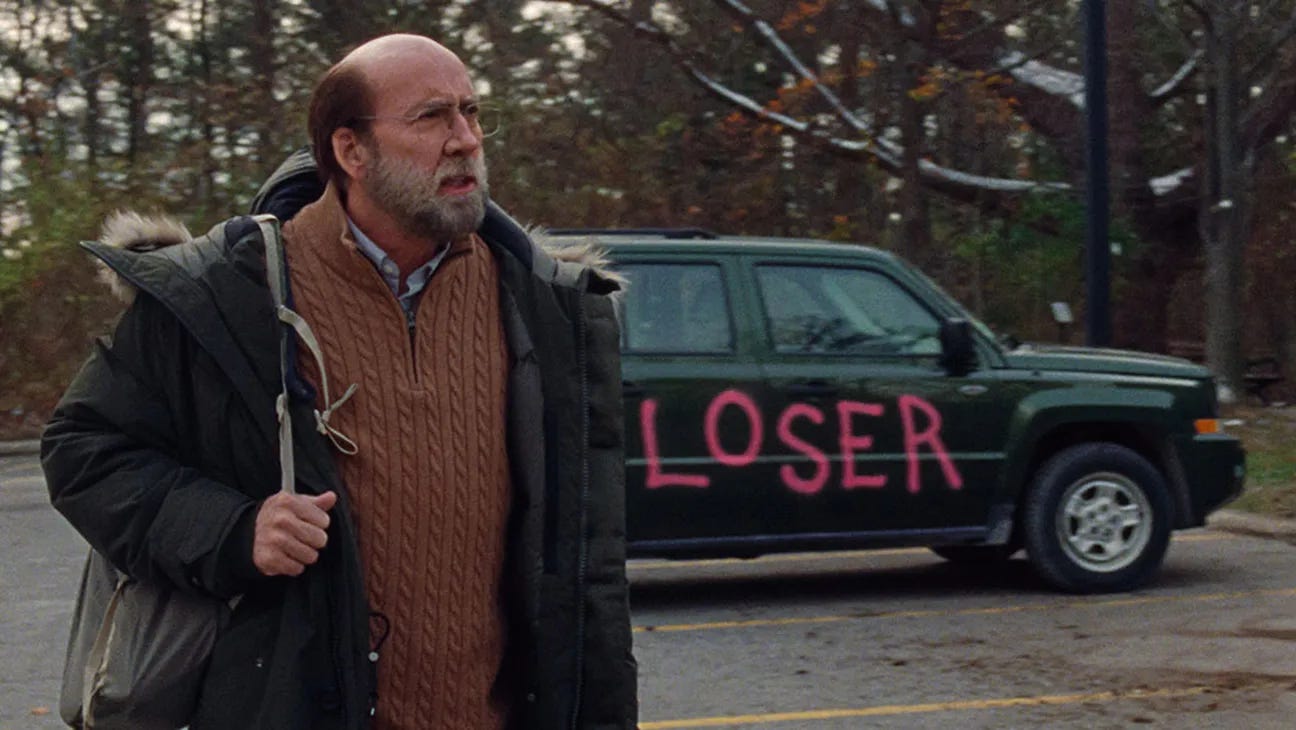
Dream Scenario (2023). Credit: A24.
If you check out the YouTube trailer for 2023's Renfield (a movie where Cage plays Dracula), you'll notice that the top-rated comment isn't a Cage quip or meme-inspired jab. Instead, the video’s most-upvoted post praises the actor's unwavering dedication and inspired performances:
I love that Nicolas Cage always gives 100 percent. It doesn't matter if the script is gold or complete crap, he knows how to commit and give it his all.
I found the commenter's earnest appreciation and the internet's overwhelming approval of this statement somewhat surprising. Of all the comments to appear on Nick Cage video with +45M views, why did this one rise to the top? Ultimately, I think this sentiment and the internet's general fondness for Cage stems from the actor's unbridled sincerity.
Celebrities often cultivate a desirable outward persona, utilizing PR events, social media, and talk show appearances to shape public perception. We become enamored with manicured representations of Julia Roberts, Ryan Reynolds, and Chirs Hemsworth while knowing very little about these individuals. Sure, everyone is entitled to privacy and deserves a personal life, but this distance cultivates an authenticity gap between actor and audience.
And then there's Nicolas Cage (God, bless him). Somehow, Cage has bridged the gap between art, internet, and reality, captivating viewers and keeping them emotionally invested in his work.
Say what you want about Nicolas Cage, but he is nothing if not hard-working and genuine. The man is unapologetically himself (for better or worse), and audiences recognize and admire his wild authenticity.
So let's hope Nicolas Cage is back (for good!) and that his future includes minimal castle purchases, box office flops, cobras, dinosaur skulls, haunted mansions, IRS penalties, direct-to-video films, and bees. Long live Nicolas Cage.
Thanks for reading Stat Significant! Subscribe for free to receive new posts and support my work.
Want to chat about data and statistics? Have an interesting data project? Just want to say hi? Email [email protected]